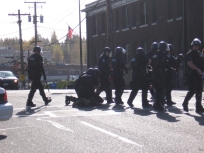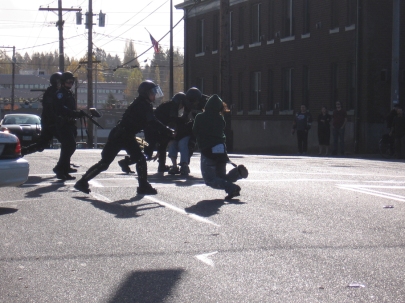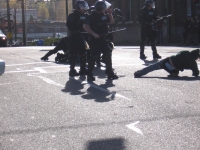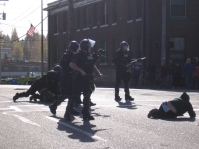Filed under: United States
This past week in Olympia, Washington a military ship docked at the port full of Strykers and other equipment returning from Iraq. The Port Militarization Resistance (PMR) was incredibly well organized and quick to respond. PMR states “We oppose Olympia’s complicity in a war whose disastrous effects have been felt worldwide and we will actively resist the use of Olympia’s port to further that war. Through nonviolent actions we intend to stop the Port of Olympia from becoming a revolving door of military machinery furthering illegal war. This war has taken the lives of 3,845 US soldiers, over one million Iraqis, and has displaced millions more. These weapons are returning to be repaired and refitted for further combat. We see this as a continuation of the war despite our nation’s and the Iraqi people’s overwhelming opposition to the war.” They held a candlelit vigil on Monday November 5th when the ship arrived and then began holding demonstrations to prevent the equipment from making its way from the port to the Fort Lewis military base. Demonstrators were attacked by police—pepper-sprayed, shoved, thrown, dragged, struck with batons—after successfully shutting down and delaying military transports out of the Port of Olympia. Fifteen demonstrators have been arrested and actions are still ongoing. For more information and video check out http://www.omjp.org/
Filed under: G8 Germany

For three days in early June the leaders from the U.S.A., the United Kingdom, France, Canada, Italy, Russia, Japan and Germany gathered for the 33rd G8 Summit in Heiligendamm, a small German resort town on the Baltic Sea. The G8 was created in 1974 to protect the interests of the world’s most wealthy and powerful countries in the face of the oil crises and recession of that time. In the last decade, the annual G8 Summit has become the site of an increasing number of demonstrations. These protests are a rejection of both the highly undemocratic methods by means of which the leaders of the eight wealthiest countries, (containing only 13% of the world’s population) make decisions for all, but also of the capitalist policies these leaders espouse, which continue to spread inequality and injustice worldwide. In response to the growing protest at each new Summit, the G8 has attempted to put on a friendlier face, claiming that its primary goal today is “how to shape globalization so that everyone stands a chance” and adding issues like aid to Africa and global warming to the G8 meeting agenda. However, one does not have to look far to see through this well rehearsed rhetoric as the agreements the G8 leaders reach do little more than treat the symptoms of the world’s problems while working hard to maintain western dominance. The growing resistance to the G8 and the current world order is serving to bring important attention to these realities.
The Alternative
The G8 demonstrations have provided the global justice movement with the opportunity to bring attention to the desperate need for relief from the exploitation of neoliberal globalization and an opportunity to network and encourage others in the movement to try to live the alternative. The theme of this year’s demonstrations, which brought an estimated 80,000 people together, was “Make Capitalism History.” Continue reading
Filed under: Mexico
 Prior to the Zapatista uprising, for generations, the 900,000 indigenous people of Chiapas have lived in oblivion. From the perspective of the global economy, being neither large consumers or producers, they have been ignored and simply in the way. The endless appetite of the global economy has resulted in, according to Subcomandante Marcos (leader of the Zapatista Army), “the destruction of our land, our culture, our collective way of working, the destruction of our women, the lack of appreciation for our elders, and the merchandising of our youth. All of this, including the lack of maintenance of our educational system and the social security system is for the benefit of the grand capital extranjero [foreigner].”
Prior to the Zapatista uprising, for generations, the 900,000 indigenous people of Chiapas have lived in oblivion. From the perspective of the global economy, being neither large consumers or producers, they have been ignored and simply in the way. The endless appetite of the global economy has resulted in, according to Subcomandante Marcos (leader of the Zapatista Army), “the destruction of our land, our culture, our collective way of working, the destruction of our women, the lack of appreciation for our elders, and the merchandising of our youth. All of this, including the lack of maintenance of our educational system and the social security system is for the benefit of the grand capital extranjero [foreigner].”
On New Years Day 1994, the first day NAFTA took effect, the Zapatista National Liberation Army rose up and took over municipalities throughout Chiapas, birthing a movement which today continues not only to resist the theft of their resources but is also creating alternative autonomous governing bodies, schools, clinics, cooperatives and means of communication. On December 29 to January 2 the Zapatistas invited internationals from around the world to come together for an Encounter between the Zapatistas and the people of the World. The invitation stated “At this encounter the Zapatista communities will speak on the experiences we have had these past years with our autonomous governments; the challenges and problems that we have faced constructing this anti-capitalist project and we will try to, with humility and respect, to respond, speak and exchange, and above all, share our errors and stumbling, and also our modest achievements.” Continue reading
Filed under: Mexico
This article can also be found on CounterPunch.
 Running as fast as I can, surrounded by hundreds of others, I can hear screams behind me. Glancing back, through the darkness of night I can only differentiate between the masses running with me and the federal police by the light reflecting off their shields and face masks. They are still advancing. A hand pushes my left shoulder and I realize there are medics behind me trying to run from the police while carrying a man on a stretcher clasping a bloody cloth to his head. The medics are trying to reach the makeshift clinic that the movement set up in a building just a few feet ahead. I continue to run block after block as more people pour in from side streets. The police are obviously advancing on multiple streets simultaneously. Panic is starting to set in. Rushing through my mind are the stories I have listened too over an over in the past two weeks while interviewing those who have suffered human rights violations at the hands of the federal police; the stories of sexual assault, of beatings, of psychological torture, of death threats. A few men duck in to an alley, I follow unsure if I am escaping the danger or running directly into it. A woman and her daughter, who recognize me from the internet cafe, motion us into their home. Inside I lean against the wall and slide to the floor. Immediately I think of those who were unable to find a place to hide, of those who could not run, people of all ages had been in the streets all day. I hear gunshots.
Running as fast as I can, surrounded by hundreds of others, I can hear screams behind me. Glancing back, through the darkness of night I can only differentiate between the masses running with me and the federal police by the light reflecting off their shields and face masks. They are still advancing. A hand pushes my left shoulder and I realize there are medics behind me trying to run from the police while carrying a man on a stretcher clasping a bloody cloth to his head. The medics are trying to reach the makeshift clinic that the movement set up in a building just a few feet ahead. I continue to run block after block as more people pour in from side streets. The police are obviously advancing on multiple streets simultaneously. Panic is starting to set in. Rushing through my mind are the stories I have listened too over an over in the past two weeks while interviewing those who have suffered human rights violations at the hands of the federal police; the stories of sexual assault, of beatings, of psychological torture, of death threats. A few men duck in to an alley, I follow unsure if I am escaping the danger or running directly into it. A woman and her daughter, who recognize me from the internet cafe, motion us into their home. Inside I lean against the wall and slide to the floor. Immediately I think of those who were unable to find a place to hide, of those who could not run, people of all ages had been in the streets all day. I hear gunshots.
Continue reading
Filed under: Mexico
This article can also be found in the Jan/Feb 2007 issue of Left Turn Magazine and in the November 2006 issue of Works in Progress.
 A popular uprising, shaking the roots of a long held exploitive power dynamic, is occurring in Oaxaca, Mexico. Not only is it threatening the corrupt and repressive government that has held control of the region for years, the movement is also creating an alternative structure for popular governance. Beginning as a teacher’s strike and evolving into a full scale popular struggle, the movement has relied on creative nonviolent direct action to stop the state government from functioning and to demand the resignation of the current Governor, Ulises Ruiz Ortiz. The impact of the struggle is reaching beyond the state of Oaxaca, adding strength to movements rooted in the poorest classes throughout Mexico. Continue reading
A popular uprising, shaking the roots of a long held exploitive power dynamic, is occurring in Oaxaca, Mexico. Not only is it threatening the corrupt and repressive government that has held control of the region for years, the movement is also creating an alternative structure for popular governance. Beginning as a teacher’s strike and evolving into a full scale popular struggle, the movement has relied on creative nonviolent direct action to stop the state government from functioning and to demand the resignation of the current Governor, Ulises Ruiz Ortiz. The impact of the struggle is reaching beyond the state of Oaxaca, adding strength to movements rooted in the poorest classes throughout Mexico. Continue reading
Filed under: Mexico
This article can also be found on ZNet, Delete the Border and in the September 26th version of Eat The State!
 Under multicolored tarps, thousands of teachers are asleep on the streets of Oaxaca City, Mexico. Their bodies lie within inches of one another in a sea of blankets, the sleeping figures separated from the pavement with only pieces of cardboard. The sounds of guard shift changes occur every two hours throughout the night. Small hand-held radios hum “Friends, compañeros, its exactly 17 past 1 in the morning on this Friday the 21st of September 2006. Another day of struggle, another day of advancement. At a winners pace.” The radio has become the life blood of this teachers strike turned popular movement in Oaxaca. Not only giving voice to the traditionally voiceless, the radio also serves as an organizing and coordination tool. It is the main communication between the tens of thousands of teachers who began in one encampment on the main square and who are now blockading over 20 government buildings, have exiled the state government from Oaxaca and are creating a democratic alternative. Continue reading
Under multicolored tarps, thousands of teachers are asleep on the streets of Oaxaca City, Mexico. Their bodies lie within inches of one another in a sea of blankets, the sleeping figures separated from the pavement with only pieces of cardboard. The sounds of guard shift changes occur every two hours throughout the night. Small hand-held radios hum “Friends, compañeros, its exactly 17 past 1 in the morning on this Friday the 21st of September 2006. Another day of struggle, another day of advancement. At a winners pace.” The radio has become the life blood of this teachers strike turned popular movement in Oaxaca. Not only giving voice to the traditionally voiceless, the radio also serves as an organizing and coordination tool. It is the main communication between the tens of thousands of teachers who began in one encampment on the main square and who are now blockading over 20 government buildings, have exiled the state government from Oaxaca and are creating a democratic alternative. Continue reading
Filed under: Mexico
 This article can also be found on Infoshop News and in the Winter 2006 issue of Slingshot.
This article can also be found on Infoshop News and in the Winter 2006 issue of Slingshot.
Graffiti calling for the ousting of the Governor of the state covers almost every blank wall as I wander through the historic district of Oaxaca City. The Zócalo, or main square, and the 50 blocks that surround it have become the home of the statewide teachers strike since the end of May. Sliding through makeshift blockades of metal sheeting and barbed wire, large pieces of concrete and in some cases reclaimed government cars and buses, I enter the encampment. On either side of the street multicolored tarps cover blankets and cardboard used at night to sleep on by the thousands involved in the struggle. In the center square a community kitchen gathers donations and prepares large pots of beans and rice. A clinic is set up by supportive workers in the medical field to serve those who have left their villages and homes and are living in the encampments. Many teachers embroider, read the latest movement communiqué, and gather in circles holding meetings. Banners from unions and municipalities from all over the state supporting this popular struggle hang between trees and light posts. Stencils depicting Mexico’s revolutionary heroes, calling for the people to rise up and demanding the release of political prisoners are everywhere. All of the amazing art of resistance reminds me of the anti-WTO actions in Seattle. This encampment in the main square marks where the movement began last May, but it has since expanded and encampments can now be found throughout the city. They now surround all government buildings in the city and protect the four radio stations and their transmitters that have been taken over and are currently held by the movement. These four channels air march and meeting announcements, discussions, alerts and calls for backup at the scenes of government repression of the movement. This is just within Oaxaca City. At least 200 villages in the state have joined in and reclaiming their town halls.
How the Movement Began
Seventy percent of the 3.5 million people who live in the state of Oaxaca are indigenous. Over half live in abject poverty, 35 percent do not have piped water in their homes. You can’t spend a day
Filed under: Mexico
This article also appears on Common Dreams and in the September issue of Works in Progress…
The sounds of gun shots echo through the streets of Oaxaca and bounce off the mountains that surround the city. It’s three a.m. and the members of the movement who are camped out in the streets huddled under tarps armed only with rocks and pipes are facing these bullets from government forces. Church bells begin to ring to signify where the attack is occurring and call for support. This movement, which began with teachers camped out in Oaxaca city’s main square, has now grown to a full fledged popular struggle including farmers, union members, street vendors social leaders camped 24 hours at all major government buildings, road blockades, 20 rural town halls and radio stations.
On August 1st a 3000 strong women’s march moved through downtown clanging pots and pans and calling for the resignation of the state governor of Oaxaca, Ulises Ruiz Ortiz. After the march ended in the main square, a contingent of 500 women decided to take over Channel 9 CORTV, a Continue reading
Filed under: Mexico
This article also appears in the August 2006 issue of Works in Progress.
The day after arriving in Mexico City, as I stood in a crowd of a half a million Mexican supporters who had travelled from all over the country, presidential candidate Andrés Manuel Lopez Obrador made his demand for a vote by vote recount of the July 2nd election. According to journalist John Ross who has covered Mexico for many years “This country is absolutely divided right down the center, between the industrial north and the indigenous, impoverished, but resource-rich south. It’s an election that has split the county right down the line geographically, politically, economically and racially.” Obrador has represented a shift to the left, supporting the poor, in alignment with the new left democracies in Latin America, although some members of popular movements consider him more to the middle. His opposition, Felipe Calderón, represents neoliberalism and continued alignment with George Bush and Washington. Obrador has refused to concede defeat in the July 2nd election where Calderon led by little more than half a percentage point amidst claims of ballot stuffing and corruption. Speaking to the crowd Obrador stated, “I have the deep conviction that despite all the machinery of the state, and all the money of a privileged group, they will not be able to stop the free will of millions of Mexicans,” he said. “That is the greatest force of a democracy.” A call was made for peaceful civil disobedience in defence of democracy and another rally on the 30th of July. The electoral court, itself accused of being in the hands of the right-wing parties, is reviewing the accounts of fraud and corruption and has until September 6th to certify a winner.

In Oaxaca, the fifth largest state in Mexico, Obrador received the vast majority of the votes, a surprising loss for a traditional conservative party stronghold. This upset is being credited primarily to a growing popular movement currently represented by a state wide strike of the democratic teachers union SNTE Section 22 in Oaxaca. On May 22nd the union declared the strike and Continue reading
Filed under: Palestine
This piece can also be read in the September 2006 Issue of Punk Planet.
Standing at the window of my Gaza Strip apartment, having heard the Apache helicopter circle a time or two around the block, I watched it drop a missile, glowing red, two blocks away. It was just past dark, people were still in the street. I grew up in the United States, I can’t begin to count the number of Hollywood renditions of such an act I have watched on the big screen, but nothing prepares you to see a piece of machinery, manufactured in your own country, drop a bomb in the neighborhood where you are living. Earlier that day on the same street, I watched children play and women weave their way through the crowd with baskets of fresh herbs balanced on their heads.
Rachel Corrie, a skinny creative free spirit entered my life right after the twin towers came down on September 11th. She contacted me while looking for others to organize with in opposition to the bombing of Afghanistan. We organized a contingent made up of grey haired grannies, a peace scout troop of hippie kids, our hesitant friends and at the Continue reading














